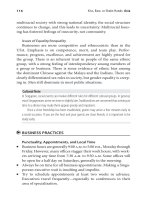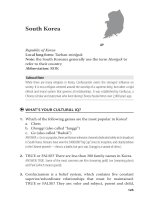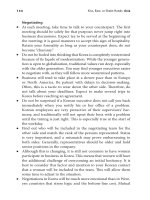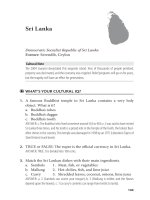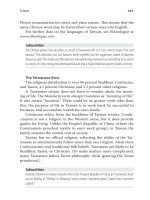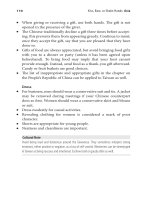Tài liệu How to Do Business in 12 Asian Countries 24 pptx
Bạn đang xem bản rút gọn của tài liệu. Xem và tải ngay bản đầy đủ của tài liệu tại đây (103.1 KB, 9 trang )
188
Kiss, Bow, or Shake Hands: Asia
The Vietnamese View
e constitution of the Socialist Republic of Vietnam guarantees
freedom of religion. e country’s diverse population follows many
religious beliefs. Confucianism (which is a philosophy more than a
religion) has had a great eect on Vietnamese thought and tradition.
Historically, the largest and most important religion in Vietnam was
Buddhism. Although the Communist government describes Bud-
dhism as currently “in decline,” it acknowledges that 70 percent of
Vietnamese are “strongly inuenced” by Buddhist tradition.
Many other religions are represented in Vietnam. Also, as is com-
mon in Asia, religious beliefs oen overlap. Vietnamese Catholics also
may go to Buddhist temples; Vietnamese Muslims also may engage in
ancestor worship. e current breakdown of religion in Vietnam is:
Buddhist
Roman Catholic—10 percent (Catholicism entered Vietnam in the
seventeenth century and was supported by the French colonials.)
Cao Dai—approximately 2 million
Hoa Hao—over 1 million
Protestant—less than a half-million
Islam—approximately 50,000 (Islam is concentrated among the
Cham ethnic minority near the coastline in Central Vietnam.)
As you would expect, views on Vietnam vary between groups.
Anti-Communists and supporters of the defeated South Vietnamese
government view today’s Vietnam rather critically. Many of these
Vietnamese le around the time Saigon was overrun in 1975. e so-
called “Boat People” who ed aer the Communist absorption of all
South Vietnam in 1976 may have cynical views of both Communist
governments and the West, because many Boat People were le to
languish in refugee camps for years by Western governments. (For
example, some spent years in camps in British-ruled Hong Kong.)
Cultural Note
Avoid carrying proscribed drugs or narcotics into or out of Vietnam. As in Malaysia and
Indonesia, drug smugglers are subject to the death penalty.
Finally, some of the many ethnic minorities of Vietnam may
also dislike the Communist government. ese include the Hmong,
who were persecuted as allies of the USA, and Vietnam’s ethnic
Chinese—a traditional merchant class who were devastated when
the Communists made private trade illegal in 1978. Almost a half-
million ethnic Chinese le Vietnam during that period, primarily
by boat. Many were encouraged to leave by the Vietnamese govern-
ment. (is mistreatment of Vietnam’s ethnic Chinese contributed
to the attack on the Vietnamese border by the People’s Republic of
China in 1979.)
■
*
Know Before You Go
To the average business traveler in Vietnam, the greatest hazard is vehicular traffic. Traffic
in Vietnam’s fast-growing cities is chaotic, with trucks, cars, motorcycles, and bicycles
all competing for space. Pedestrians can be in as much danger as drivers and their pas-
sengers. Exercise caution and hire a driver rather than drive yourself.
After dark, foreigners should avoid using the less-regulated forms of transport, such
as motorcycle taxis and cyclos (also known as pedicabs). Also, at any time of day, you
should negotiate the fee before entering a motorcycle taxi or cyclo: they have no meters.
In a taxi, insist your driver use his meter.
Violence against foreigners is very rare, in part because the penalties for harming a
foreigner are draconian. A Vietnamese who killed a foreigner in 1996 was quickly found,
tried, and executed.
Cultural Note
To date, Vietnam has had only one Nobel Prize laureate. In 1973, the Nobel Peace Prize was
jointly awarded to Henry Kissinger and Le Duc Tho for their contributions to the Vietnamese
peace negotiations. These were (to say the least) controversial choices—especially because
the peace negotiations did not prevent North Vietnamese forces from overrunning South
Vietnam in 1975–76. As it happened, Le Duc Tho declined to accept his peace prize.
●
3
CULTURAL ORIENTATION
Vietnam’s recent history has been highly dynamic and there has
not been much detailed study of Vietnamese cultural orientations at
Vietnam
189
190
Kiss, Bow, or Shake Hands: Asia
the time of this publication. Pending further research, the following
observations can be made:
Cognitive Styles: How Vietnamese Organize
and Process Information
Historically, by accepting the foreign concept of Marxism, the
leaders of Vietnam became closed to outside information. Because
the Communist victory took the better part of a century, unswerv-
ing dedication to Marxist ideals became a necessity. However, the
Communist reunication of divided Vietnam took place during the
decline of global Communism. e dissolution of Vietnam’s primary
benefactor, the USSR, required the Vietnamese leadership to become
more open to other, non-Communist ideals.
As a market-oriented society, Vietnam’s decision makers and
businesspeople have—of necessity—become more open to outside
concepts and more analytic than associative. Nevertheless, they may
place more value on relationships than obedience to abstract rules of
behavior.
Negotiation Strategies: What Vietnamese Accept as Evidence
Vietnamese relate each instance to their own experience, mak-
ing search for truth highly subjective. Even experienced Vietnamese
businesspeople may not make decisions entirely based on objective
facts.
Value Systems: The Basis for Behavior
e following three sections identify the Value Systems in the
predominant culture—their methods of dividing right from wrong,
good from evil, and so forth.
Locus of Decision-Making
While responsibility for decision-making rests on the shoulders
of the individual, decisions are always made with the family in mind.
A Vietnamese will oen consider “What is best for my family?” when
making a choice.
Sources of Anxiety Reduction
Vietnam’s current transition to a market-oriented economy oers
exciting opportunities for its citizens, but it also causes great anxieties.
ere are clear winners and losers. Vietnamese laborers in inecient,
state-owned industries know that they will be among the losers.
e extended family forms the basic unit of Vietnamese society
and also provides the main source of security. Ancestor worship
reinforces the importance of the family as well.
Issues of Equality/Inequality
Vietnam remains a hierarchical country. Under Confucian tradi-
tion, each person has a place and knows to whom to defer. Hierar-
chical structures are also found in government, business, and other
organizations.
e ethnic Vietnamese have traditionally looked down upon the
country’s ethnic minorities. e rural minorities, such as the Mon-
tagnards (mountain people), have oen reinforced Vietnamese ste-
reotypes by trying to remain separate from mainstream Vietnamese
society.
e Communist ideal includes gender equality, and women have
equal rights under the law. However, Vietnam is still a male-dominated
country, both in business and government. In most ethnic groups,
the husband remains the titular head of the home. e aged are con-
sidered more knowledgeable than the young, and their opinions are
highly respected.
●
3
BUSINESS PRACTICES
Punctuality, Appointments, and Local Time
●
Ocial business hours are generally from 7:00 or 7:30 .. to 4:30
or 5:00 .., Monday through Friday. Many people take a long
lunch break.
●
Punctuality is key; be on time for all business engagements.
●
Being prompt is not as vital for social events, but do not be more
than a half-hour late.
Vietnam
191
192
Kiss, Bow, or Shake Hands: Asia
●
In Vietnam, as in most other countries, the day is written rst,
then the month, then the year (e.g. December 3, 2010, is written
3.12.10).
●
Prior appointments are necessary; do not try to make an
impromptu oce visit.
●
e country of Vietnam is seven hours ahead of Greenwich Mean
Time (G.M.T. + 7), or thirteen hours ahead of U.S. Eastern Stan-
dard Time (E.S.T. + 13).
Negotiating
●
e Vietnamese are great fans of bargaining. ey dicker over the
price of everything, from taxi rides to real estate. When you nally
get around to talking about the price, expect them to negotiate
aggressively.
●
Connections are all-important in Vietnam. You cannot do any-
thing unless you are know the right (that is, powerful) people.
Personal introductions are preferred, but a letter of introduction
is better than nothing.
●
e Vietnamese need to personally trust you before they will do
business with you. Expect to spend a substantial amount of time
exchanging small talk, drinking tea, and developing a rapport. Do
not consider this time wasted.
●
In common with other Asian cultures, the Vietnamese will oen
say what they believe foreigners want to hear. It is your job to learn
to tell the dierence between honest agreement and a polite-but-
insincere “yes.”
●
High pressure and emotion have little place in business in Viet-
nam. Most would rather let a deal fall through than be rushed.
Business Entertaining
●
Your Vietnamese host will give at least one meal in your honor.
You should return the favor by hosting a meal at an international
hotel or ne restaurant.
●
Business meetings are oen held over lunch. Dinners are usually
considered social occasions, but work can be discussed—if your
Vietnamese counterpart initiates the topic.



